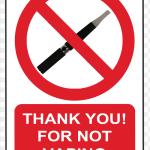The UK's National Health Service just published the results of its survey Smoking, Drinkin
public health
If the media tells you a group of chemicals is dangerous, be skeptical. The compounds in question may indeed be harmful, but there's a good chance they're reasonably safe and make our lives better.
Join ACSH directors of bio-sciences and chemistry Cameron English and Dr. Josh Bloom as they break down these stories on episode 18 of the Science Dispatch podcast:
What do you do when the evidence doesn't support your conclusion?
Organic activist group Slow Food recently released its list of “10 Key Facts on Pesticides," a post designed to “raise awareness about the risks and dan
Join ACSH directors of bio-sciences and medicine, Cameron English and Dr. Chuck Dinerstein, as they break down these stories:
Join ACSH director of bio-sciences Cameron English and Dr. Billauer as they break down these stories:
Consider for a moment the following paragraph: Scientists should not sit on the sidelines and watch others fight this out. More research into the public health impacts of vaccination will provide further evidence of its deadly consequences.
"The health care costs attributable to vaping are already substantial and likely to increase." So concluded the authors of a study just published in the journal Tobacco Control.
At just three months old and with no warning, my older brother—my parents' first child—died in his sleep at the babysitter's house, a tragic case of a very rare condition called sudden infant d












